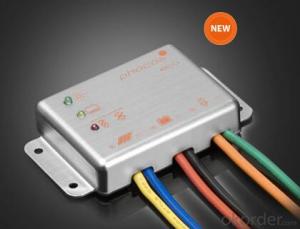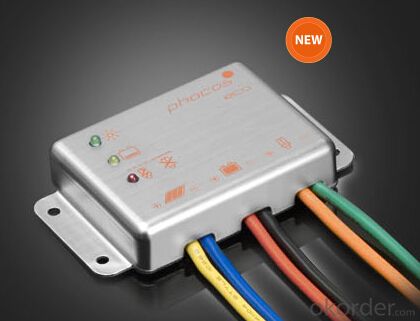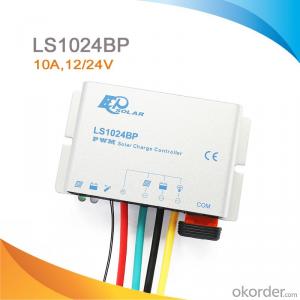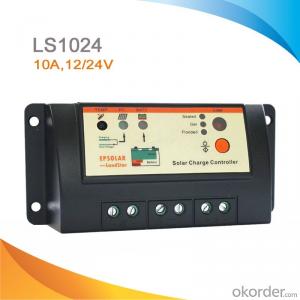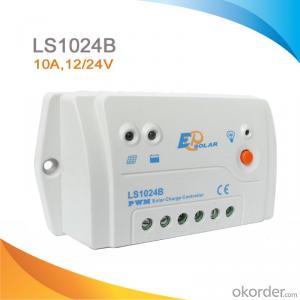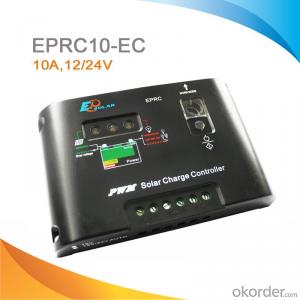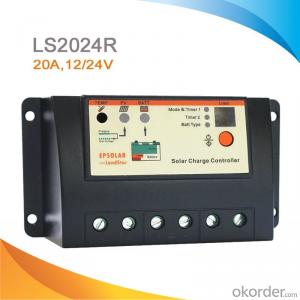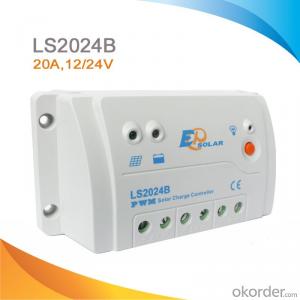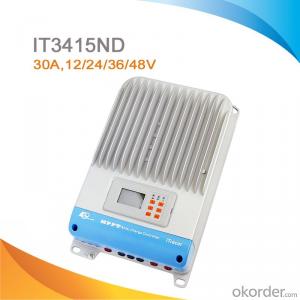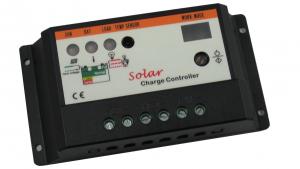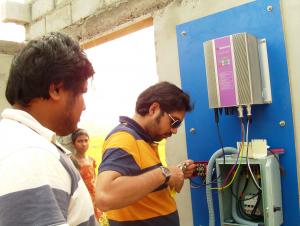Eco (10 A) PWM Solar Charge Controller
- Loading Port:
- China Main Port
- Payment Terms:
- TT OR LC
- Min Order Qty:
- -
- Supply Capability:
- 10000 unit/month
OKorder Service Pledge
OKorder Financial Service
You Might Also Like
· Electronically regulated charging mode: boost, main and float charge
· Deep discharge protection
· PWM series regulation (PV panel is not short-circuited)
· Integrated temperature compensation
· Fully electronically protected against: panel surge voltage, wrong polarity (panel or battery), overload and short circuit at load
· Three LED indications: Charge Status, SOC, LVD, Overload/Short Circuit
· IP68 protection
· The new version of the ECO solar charge controller series is especially designed for small solar systems requiring low-battery disconnect. The ECO series is fully electronically protected. Three LEDs display charging progress,battery SOC and load status (load disconnect).
· Rural electrification systems are the typical applications for this product. It is a perfect solution for cost-sensitive systems.
- Q: How do I monitor the performance of a solar controller?
- To monitor the performance of a solar controller, you can follow these steps: 1. Check the display: Most solar controllers come with an LCD display that shows vital information such as battery voltage, current, charging status, and load status. Regularly checking this display will give you an idea of how your solar controller is performing. 2. Monitor battery voltage: Keep an eye on the battery voltage to ensure it remains within the optimal range. If it consistently falls below or exceeds the recommended levels, it could indicate a problem with the solar controller. 3. Evaluate charging and discharging rates: Observe how efficiently the solar controller charges the battery during the day and discharges it during the night. If you notice any significant discrepancies or irregularities, it may indicate a performance issue. 4. Use a data logging device: Some advanced solar controllers allow you to connect a data logging device that records and stores performance data. This data can be analyzed later to identify any patterns or anomalies in the controller's performance. 5. Regularly inspect connections and cables: Ensure all connections between the solar panels, battery, and controller are secure and free from any corrosion or damage. Faulty connections can affect the controller's performance. 6. Consult the user manual: Refer to the user manual provided by the manufacturer for specific instructions on monitoring and troubleshooting the solar controller. It may contain additional guidance or specific indicators to look for. By regularly monitoring these aspects, you can ensure your solar controller is operating optimally and take necessary action if any performance issues arise.
- Q: What are the temperature compensation features in a solar controller?
- Temperature compensation features in a solar controller refer to the functionality that allows the controller to adjust and optimize its charging parameters based on the temperature of the solar panels. This compensation is necessary because the efficiency of solar panels can vary with temperature, affecting the charging process. By compensating for temperature changes, solar controllers can ensure that the charging voltage and current are adjusted accordingly to maximize the performance and lifespan of the solar system.
- Q: Can a solar controller handle power fluctuations from the inverter?
- Yes, a solar controller can handle power fluctuations from the inverter. The solar controller regulates and controls the flow of electricity from the solar panels to the battery bank, ensuring a stable and consistent power supply. It is designed to handle fluctuations in power output from the inverter and maintain a steady flow of energy to the batteries.
- Q: How does a solar controller handle high voltage input from solar panels?
- A solar controller, also known as a charge controller, is responsible for regulating the flow of electricity between solar panels and the battery bank or load. When it comes to handling high voltage input from solar panels, the controller employs various mechanisms to ensure the safety and efficiency of the system. Firstly, a solar controller typically features a maximum power point tracking (MPPT) algorithm. This algorithm enables the controller to track the maximum power voltage and current at which the solar panels can operate. By constantly monitoring the voltage and current, the MPPT algorithm adjusts the operating point of the solar panels to extract the maximum power output, even under changing weather conditions or partial shading. This effectively optimizes the energy harvesting capability of the solar panels and prevents any damage that might occur due to excessive voltage. Additionally, a solar controller incorporates various protective features to handle high voltage input. One of the key components is the voltage regulator, which acts as a voltage limiter. It ensures that the voltage from the solar panels does not exceed a certain pre-set value, typically the rated voltage of the battery bank or load. If the input voltage exceeds this limit, the controller automatically reduces the voltage to a safe level before allowing it to reach the battery or load. Furthermore, a solar controller may incorporate over-voltage protection mechanisms. These mechanisms detect and respond to any sudden spikes in voltage that may occur, such as during lightning strikes or electrical surges. By promptly disconnecting the solar panels from the battery or load, the controller prevents any potential damage to the system. In summary, a solar controller handles high voltage input from solar panels by utilizing the MPPT algorithm to optimize power output, employing a voltage regulator to limit the voltage within safe parameters, and incorporating protective features to prevent damage from over-voltage situations. These mechanisms ensure the safe and efficient operation of the solar energy system, allowing for maximum energy harvesting while safeguarding the connected components.
- Q: Can a solar controller be used with a battery bank that has different battery chemistries?
- No, a solar controller cannot be used with a battery bank that has different battery chemistries. It is essential to use batteries with the same chemistry in a battery bank to ensure proper charging and discharging cycles. Mixing different battery chemistries can lead to imbalances, inefficient charging, and potential damage to the batteries.
- Q: What is the maximum power consumption of a solar controller?
- The maximum power consumption of a solar controller typically depends on the specific model and its features. However, in general, the power consumption of a solar controller is relatively low, usually ranging from a few milliwatts to a few watts.
- Q: Can a solar controller be used with solar-powered indoor ventilation systems?
- Yes, a solar controller can be used with solar-powered indoor ventilation systems. A solar controller regulates the power output from solar panels and ensures the efficient operation of the ventilation system by managing battery charging and maintaining optimal voltage levels.
- Q: Can a solar controller be used with solar panels that are connected to a solar cooling system?
- Yes, a solar controller can be used with solar panels that are connected to a solar cooling system. A solar controller is an essential component of any solar power system, including solar cooling systems. It regulates the flow of electricity from the solar panels to the cooling system, ensuring that the panels are operating at their optimal efficiency and that the cooling system is receiving the right amount of power. The solar controller helps manage the charging and discharging of the batteries in the system, preventing overcharging or excessive discharge, which can lead to damage. It also monitors the voltage and current output from the solar panels, ensuring that the cooling system receives a steady and consistent power supply. In a solar cooling system, the solar panels collect sunlight and convert it into electricity, which is then used to power the cooling system. The solar controller plays a vital role in controlling the power flow and ensuring that the cooling system operates effectively. By utilizing a solar controller, the solar cooling system can maximize its energy efficiency, reduce energy consumption, and increase overall system performance. It also helps to extend the lifespan of the solar panels and batteries by preventing any potential damage caused by irregular power flow. In conclusion, a solar controller is a crucial component in a solar cooling system that allows for the efficient and effective use of solar panels to power the cooling system.
- Q: How does a solar controller prevent damage from over-discharging of batteries?
- A solar controller prevents damage from over-discharging of batteries by constantly monitoring the battery voltage and disconnecting the load when it reaches a certain low voltage threshold. This prevents the batteries from being drained beyond their recommended depth of discharge, which can lead to irreversible damage and reduced lifespan.
- Q: What is the difference between a solar controller and an inverter?
- A solar controller and an inverter are both essential components in a solar power system, but they serve different purposes. A solar controller, also known as a charge controller or regulator, is responsible for managing the power flow between the solar panels and the batteries. Its main function is to prevent overcharging or undercharging of the batteries by regulating the voltage and current from the solar panels. It ensures that the batteries receive the optimal amount of charge, extending their lifespan and maximizing their efficiency. Solar controllers are typically used in off-grid or hybrid solar systems. On the other hand, an inverter converts the direct current (DC) electricity produced by the solar panels or stored in the batteries into alternating current (AC) electricity, which is the type of electricity used in most household appliances and the power grid. Inverters are necessary in grid-tied solar systems because they allow the solar-generated electricity to be fed back into the electrical grid, reducing or eliminating the need for conventional electricity from the utility company. They also ensure that the AC power is synchronized with the grid's frequency and voltage requirements. In summary, while a solar controller regulates the charging of batteries and controls the power flow from solar panels to batteries, an inverter converts the DC electricity into AC electricity for use in homes or to be exported to the grid. Both components play crucial roles in a solar power system, ensuring optimal performance, efficiency, and compatibility with the electrical grid or off-grid setup.
Send your message to us
Eco (10 A) PWM Solar Charge Controller
- Loading Port:
- China Main Port
- Payment Terms:
- TT OR LC
- Min Order Qty:
- -
- Supply Capability:
- 10000 unit/month
OKorder Service Pledge
OKorder Financial Service
Similar products
Hot products
Hot Searches
Related keywords
